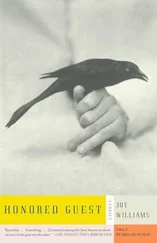Before the mother died, things were more … under control, more up to date. The rooms had furniture, clean slipcovers, rugs. In the cupboards were candles and cans of food. The children were sent off to school with thermoses of soup. A piece of fruit. A slice of meat. Raw vegetables. Healthful, balanced meals. There were always flowers on the table. Even in the winter, there were paper arrangements. There was a smell of wax and washing and cooking. Of life being mildly but thoroughly employed.
But now … the house is so empty. Everything has been sold or given away. The members of the congregation comment on this without coming to any decision. There are leaves in the hallway, a box on the floor filled with summer dresses, cracks in the plaster and windowpanes. Some purpose has been forgotten. Some simple lesson and requirement of family life has been found unnecessary and not resumed. The rooms are being abandoned, their services discontinued. There’s no telling how long this has been going on. It was this way before the funeral. The day of the funeral, when the women of the church arrived to fix the salads, set up the folding chairs, when the men came to remove the remains, they discovered that there was a great deal to do. They freshened things up as best as they were able. It was a house, it was clear, where someone had been sick for a very long time. And yet, of the Mrs. there was little trace. Two rooms, right off the kitchen, there was a woman’s place it seemed, a private place. The walls pale yellow, birds and fruit carved into the mantel, a canopied bed. But the comforter was flung back to expose the mattress ticking. Rust and water marks. An ant cake in the corner. A sense of departure, dismissal …
As for the other rooms, there seemed no plans for their use. Most are completely empty, the others almost so. One enormous sunroom on the third floor, spreading out above the sea, has a few of the child’s toys in it, a record player, a stack of albums. They would look through them briefly. Classical music. Churchly music they supposed. And there was the child’s room. They didn’t enter that. There was a faded stencil of tiny animals on the door. The door was closed. They had a strong sense of what was right. There are three bathrooms. One has a tub filled with damp clothes and towels. Another has a tub filled to the brim with water. Cold. There is a fat creamy bar of soap in the dish. A bumpy rubber mat to keep a bather from a slip and a nasty fall. A box of powder on the commode top. Perhaps the Mrs. had drawn herself a bath, poor thing, just before she passed away. They don’t blame the Reverend for wanting to keep it up, if indeed it’s so. Perhaps it’s just a gummy drain. They remember in Mr. Smiley’s salt-box, in the dining room, the table’s still set as it was on the night fifty years before when the Smileys Sr. failed to return for dinner and failed ever to return again, having been crushed when a haywagon overturned on them. It was how young Smiley showed his due to them. They can understand that.
The third bathroom seems functional enough. Shaving brush. Bubbles of toothpaste in the sink. They didn’t go in. No one had the need to.
UNDER THE CIRCUMSTANCES they had examined the house as best they could. It had been a fine house. Once everyone had wanted to live in it. That wasn’t so long ago. Now it was as dark and strange to them as an idea of Europe. They had to walk through it again to see what the problem was.
The child stood in the kitchen eating dry cereal from a bowl. She looked feverish and thoughtful. The oil painting was leaning against the wall. It slipped flat onto the floor without a sound. Someone picked it up and set it on the table. The child showed no interest in the painting. She was really not a very curious child, they thought. Children were supposed to be curious and shy. She ate Cheerios, picking out the perfect O’s. They made themselves some more tea. Outside the kitchen window was a sparrow strangled in the end coils of the clothesline. It could have just happened or it could have happened in the last month. No one mentioned it. They didn’t want to bring it to the attention of the child. She was really not a very observant child, they thought. The wind blew in from the sea but the bird didn’t move. Icicles sparkled on its breast like spurs.
“I have a cold,” the child said, “and won’t be going to school for a week. I have all my books at home and I also have books from the library. They’re overdue. I have an excellent one called The Lore of the Horse . One white foot, buy a horse, two white feet, try a horse, three white feet, look well about him, four white feet do without him. Daddy doesn’t ride. If he did it would be wonderful. We could employ ferries and planes when necessary and ride right around the world. I know everything about horses. Horses know everything about us. You can tell the future by reading the hairs in a horse’s mane. Of course you shouldn’t do that.”
“I’d bet you’d like to run off to the circus and be a bareback rider,” Morgan, the carpenter, said. His wife looked at him and rattled her teacup. “Little girls do not run off to the circus,” she said. “Only little boys do.”
“Well, where do they get their girls from then,” he said loudly, not looking at her but at his neighbor, the man who sharpened blades.
“I have seen a circus only once in my time,” the man who sharpened blades of all sorts said. “And it was not an astounding thing as they would like to have you believe. For example, the bareback rider, who, in this case happened to be a young man (he said this sadly to Mr. Morgan), a heavy-set fellow of another extraction, missed. He did not miss the first time or the third time, but in the middle of his act, he made a poor judgment and did not come in contact with the horse at all. Of course this is what everyone remembered. Had he done his job as he was supposed to, no one would have thought about him further.”
“Isn’t that the way, though,” someone said.
“Why should I run off anywhere?” the child said.
“He didn’t mean that, dear,” Mrs. Morgan said. “You want to stay right here for now and take care of your father.”
“Daddy cares for me beautifully,” the child said, “and I care for him.”
The house was still. There was not even the sound of a clock. Then there was a dry scrabbling at the door and the child got up and let in her dog. The hair beneath the dog’s chin was gray. The child went to the refrigerator and made a sandwich which she fed to the dog. “We have everything pretty much in order now,” she said. “Though we thank you very much and though they were delicious, we won’t be needing any of your casseroles in the future. Those noodles and meatballs that one of you dropped off Tuesday night were really delicious. We added a little wine and we ate it all right up.”
“Wine?” Bettencourt, the fisherman, said the word so angrily that it seemed to all present that he had cursed. He still wore his crude gloves, stained with grease and with a hole in each thumb. His lips were blue, even in the summer, from working on the water and his eyes were half shut.
“A full red wine is always a great help in cooking,” the child said.
“I had no idea your father partook,” one of the ladies said.
“I don’t think wine is good for you, dear,” another lady said, venturing to touch the child’s shaggy bangs. Each felt giddy with a liberty they couldn’t understand. The Reverend didn’t seem to be home. They had almost forgotten the painting, the solemn, thoughtful reason for their visit. Hadn’t the sea always seemed safer than this house? Wasn’t there something about this house that was as difficult to discover as the nests of the sea birds? They glanced around it stubbornly, all but a few ignoring the child. Dirt in the potato bin; no potatoes. Up on the sill, a big seed of something, its root end hanging over a dry glass. Another relic of the mother. Nothing visible. Why were they so curious and confused? Two women left the room and softly padded up the stairs. The child heard them. She put more water on to boil. She slipped about, like an unpunished, untethered pet, across the floor boards, creaking and familiar and all her own. She watched the women go up the stairs.
Читать дальше












